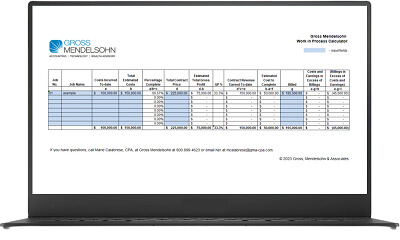Thanks to a variety of industry quirks, construction companies are especially vulnerable to IRS audits. However, by avoiding some common audit triggers you can keep Uncle Sam away.
Here are four ways to minimize your risk of an IRS audit.
1. Consider the Accrual Method
It is no secret that many contractors prefer the cash method of accounting to the accrual method of accounting, which can be more complex and sometimes require you to pay taxes on income you have not yet received. The IRS, on the other hand, is not a big fan of cash accounting because it can delay tax payments.
Generally, the IRS allows contractors with less than $30 million in annual average gross receipts (over a three-year period) to use the cash method (updated for inflation by Rev Proc 2023-34).
If you are audited and you have been using the cash method when you should have been using the accrual method, you may be forced to postpone deductions and pay penalties. Even if you are not required to use the accrual method, be aware that using the cash method may invite IRS scrutiny.
2. Mind Your Independent Contractors
Independent contractors are a big part of the construction industry. However, if your business uses them, proceed with caution. The IRS has long believed that a significant percentage of employers misclassify employees as independent contractors. Whether or not an individual is considered an independent contractor or employee is a continuing issue that has been challenging for employers for decades. In order to minimize risk and liability for back taxes, back wages and associated penalties, contractors should regularly revisit their relationships with subcontractors, especially any used frequently or for long-term contracts.
While facts and circumstances of each case determine whether a worker is treated as an employee or independent contractor, certain factors are essential to the determination.
The IRS typically examines three main categories:
Financial Control
Generally, the more control the employer has over the finances associated with a job, the more likely the worker is an employee. Employees use their employer's equipment, get paid based on the number of work hours, get reimbursed for expenses, and receive paid time off and other benefits. Independent contractors generally use their own equipment, pay their own expenses, and can experience profit or loss on jobs. Often, they are paid a flat fee for their services rather than an hourly wage.
Behavioral Control
In general, the more control the employer has over what a worker does, and how and when they do it, the more likely the worker is an employee. Factors to consider include the level of training and instruction provided, control over when the work is performed, and whether performance evaluations exist.
Nature of the Relationship
More often than not, employees are hired full-time and work for a single employer. On the other hand, independent contractors are usually engaged on a contract basis and often offer their services to multiple businesses. Workers who are trusted with key business operations are likely to be considered employees.
What If the IRS Disagrees?
If the IRS reclassifies an independent contractor as an employee, there might be significant consequences. You may be held liable for back taxes, including income taxes that should have been withheld, and both the employer and employee shares of payroll taxes, plus penalties and interest. Additionally, you can incur penalties even if the worker paid their tax obligations as an independent contractor.
Besides having to pay back taxes, you may also be vulnerable to claims by misclassified employees for employee benefits, minimum wages or overtime, as well as penalties for failure to meet I-9 requirements.
3. Keep Long-term Contracts Legit
As you may know, contracts that span over two calendar years are considered long-term. What you may not know is that the IRS watches these carefully to make sure contractors pay their taxes on the monies involved in a timely manner.
Many long-term contracts are subject to the percentage-of-completion method, which requires contractors to pay taxes each year on the portion of the contracts that were finished in that year. Some smaller contractors are allowed to use the completed-contract method, which lets them put off paying taxes until projects are done.
If you’re using the completed-contract method, keep in mind that the IRS may look into such contracts to make sure you’re not unnecessarily dragging out the terms. A couple of potential audit triggers: 1) a delay in completion of a contract that’s almost done to the next tax year and 2) a contract that contains separate projects that could be treated as separate contracts, such as identical apartment units.
Check out our blog post, 3 Types of Construction Contracts: Their Pros and Cons for Owners and Contractors, for a refresher on contracts.
4. Consider an “S” Election
In certain cases, operating an S corporation can help shield you from an audit more effectively than a single-member limited liability company (LLC) or a sole proprietorship.
Contractors who own LLCs are six times more likely to be audited than those with S corporations, a recent IRS study shows. Although you shouldn’t change your business structure just to minimize IRS scrutiny, it is a factor worth considering when reviewing how your construction company is set up.
There's No Magic Bullet
With a growing federal deficit to plug, the government has hinted that taxpayers should expect more audit crackdowns going forward. Even if you have nothing to hide, an audit can be an expensive process, draining valuable time and resources from your business.
There’s no magic formula for keeping the IRS away from your door, but taking the right precautions should at least reduce your risk of getting stuck with an audit. That increases the likelihood that you’ll have more time to focus on what’s important — running a successful construction company.
Need Help?
Contact us online or call 800.899.4623.


